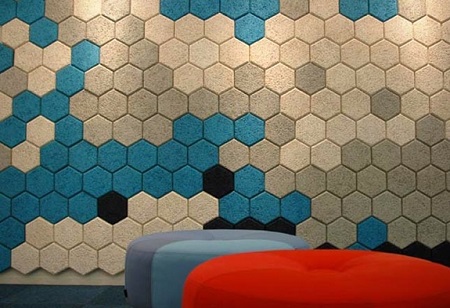With increasing urbanization and industrialization, noise has evolved to be the greatest concern of modern society . Although an invisible menace, persistent exposure to invasive noise can have serious consequences. It is estimated that long-term exposure to noise such as busy traffic, railways and aircraft causes 12,000 premature deaths per year in Europe alone. Mental health and wellbeing are also found to be negatively impacted by 'environmental turbulence', whilst Oxford University reported a correlation between increased levels of traffic noise over long periods of time and obesity.
That being said,
Acoustic panels have been one strategy for dealing with the rising situation of noise pollution.
Acoustic insulation panels comprising a combination of fibres and recycled polyurethane foam are proven to be particularly effective in reducing sound transmission between walls, up to 87% in some cases, a truly stunning performance that does much to increase the comfort and wellbeing of occupants closeted from incessant, everyday noise pollution.
Today, the global acoustic industry is growing at a considerable rate. So much so, that the global acoustic insulation market size is estimated to reach USD 17.1 billion by 2026. The industry is also evolving in terms of technology adoption and multiple innovative products are also hitting the market that are expected to transform the acoustic insulation industry in the coming years. In this article, let's shed light on the most innovative trends of the acoustic insulation industry.
Eco -efficient Insulation
There are hundreds of companies today offering extensive ranges of ready-made and bespoke acoustic products, designed to improve the architectural acoustics of any space, from soundproofing to noise transmission reduction. Environmentally friendly architectural acoustics have never been more important.
However, as the market has grown in size, so have the concerns surrounding the sustainability elements involved in the sourcing and production of acoustic products and acoustic-improving building materials.
As more and more developers and building owners are striving for more environmentally friendly buildings, not only in energy consumption but also in construction materials, we are here to highlight some of the key things you need to know about sustainable and eco-friendly architectural acoustics.
Arup, a Uk based company in collaboration with Mogu, a Italian biodiesel firm has developed a biodegradable mycelium-based acoustic panel system named FORESTA. The FORESTA system is made up of mycelium-based acoustic panels, which are the vegetative tissue of fungi. Each module is supported by a frame made of local beech wood and is produced by mushroom cultures on a substrate made of agricultural wastes like hemp chives and textile remnants.
Recycled PET Insulation
PET Polyester Acoustic Panels are an acoustically absorbent panel made from 100% PET plastic with a felt-like finish. These Polyester Acoustic Panels are Porous in nature which makes them ideally suitable for Acoustic Treatment, sound absorption, Heat and thermal insulation. Polyester Acoustic Panels are sound absorbing panels developed with environmental friendliness in mind. The panels are made up of 100% polyester, 60% recycled fiber, and are 100% recyclable. Panels offer many environmental advantages and are an honest alternative to a standard fabric wrapped fiberglass panel.
Characteristics of polyester fiber acoustic panels include light weight & flexibility, very high tension, dimension maintenance even in high humidity & temperature, conservation of color sunlight, unaffected surface on wetting, and simply expandability. Other features of polyester acoustic panels include formaldehyde-free, no binding agents, odorless and dust-free, no risk of skin irritation or respiratory problem, PET-recycled content, and 100% recyclable.
For example - Solace Acoustic, has developed a PET insulation that is made up of 100% pure polyester fiber, and 60% recycled fiber. These acoustic insulations are non irritating, nontoxic, and nonallergic so one is completely safe to touch. PET Acoustics is another company providing PET acoustic insulations to its clients. Their PET acoustics board is made from partially recycled polyester fibers, more than 60% of which are recovered from PET bottles by the PET acoustic fiber company.
What’s Next?
Increasing noise pollution in urban cities has been a developing challenge that calls for urgent solutions. Acoustic panels are definitely an effective way of meeting this daunting problem. Moreover, the recent transit of the acoustic industry towards sustainable innovations will help the industry to evolve as a go to solution for the clients.
Along with eco -efficient Insulation and recycled PET Insulations, the industry is working to develop new innovative solutions that will help the industry to evolve into a robust position.
